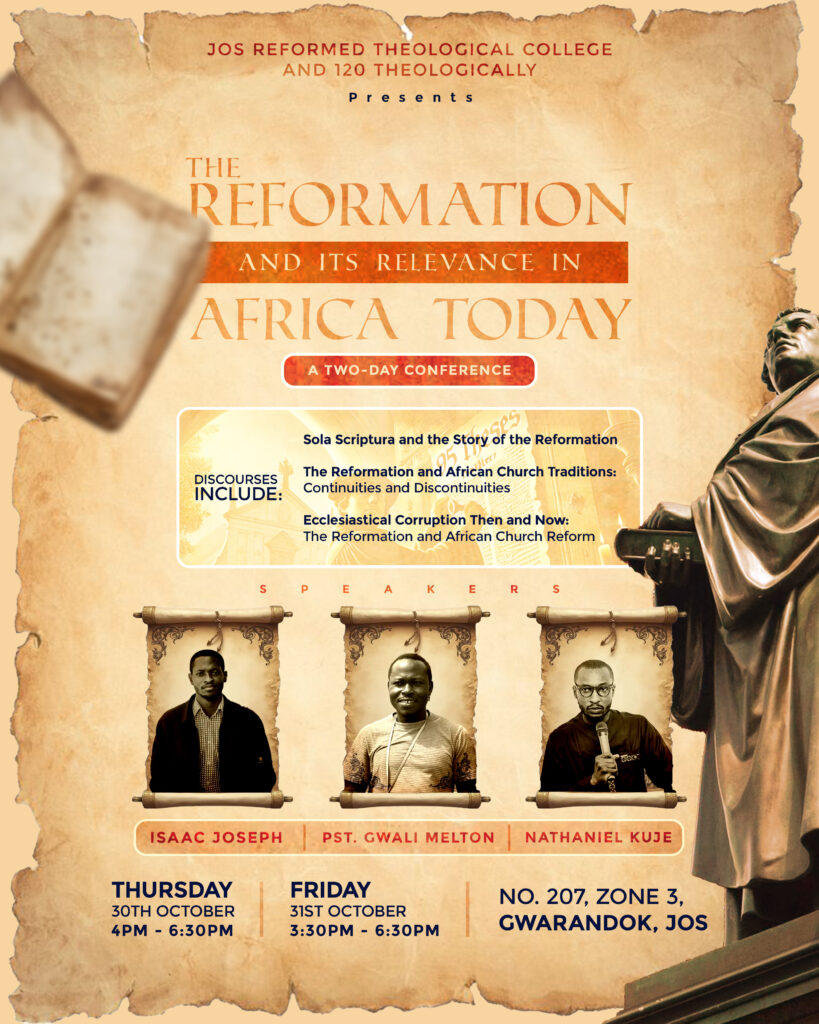The Protestant Reformation of the sixteenth century marked a recalibration in Christian theology and church life. What began as a series of theological disputes within the Western Church produced lasting shifts in doctrine, worship, church government, and the locus of authority. The movement was not a single event but a constellation of reforming initiatives that returned the Church to renewed confidence in Scripture and in the gospel of God’s free grace.
This article provides a compact account of those developments and draws lines of continuity to the concerns the Reformation Conference 2025 will treat: the authority of Scripture, justification, the marks of the true Church, the means of grace, and the vocation of the Church in African society.
Historical Background and the Necessity of Reform
By the early sixteenth century, a number of existing tensions had reached a breaking point in Western Christendom. Among these were the sale and abuse of indulgences and ecclesiastical offices, an increasing gap between pastoral realities and official teaching of the Church, and widespread dissatisfaction with clerical morals and the management of church wealth.
Martin Luther’s public disputation over indulgences and his wider theological challenge to medieval practices ignited debate that already had intellectual and devotional momentum within Europe. Luther’s Ninety-Five Theses are rightly understood as a theological intervention aimed at correcting abuses and restoring pastoral fidelity to the gospel.
According to Encyclopedia Britannica, “the Reformation produced a doctrinal recovery centered on Scripture and justification,” a movement that has been well-documented by historians.
A closer historical reading shows that the Reformation’s necessity lay not primarily in institutional rivalry but in a pastoral and theological crisis: Christians were being taught a religion of works and human mediation rather than the gospel taught in the New Testament. Reformers such as Luther and Calvin insisted that the Church must be reformed according to the teachings of Scripture. Their labors gave rise to theological commitments summarized in slogans such as “Scripture alone” and “faith alone,” which sought to reorient the life of the Church around God’s revealed Word and the centrality of Christ’s finished work.
As one study notes, “these recoveries were responses to real pastoral harms and doctrinal distortions,” with lasting consequences for worship, preaching, and ecclesial accountability Chapman University Digital Commons.
Theological Centerpieces: What the Reformers Recovered
Three convictions require brief emphasis because they shape both the Reformation’s identity and its contemporary application.
1. The authority and sufficiency of Scripture:
The Reformers affirmed that Scripture is the final authority for faith and life. This conviction reoriented preaching, catechesis, and pastoral care around the biblical text, challenging ecclesiastical traditions that had become authoritative in place of Scripture.
2. Justification by faith alone:
The Reformers insisted that sinners are declared righteous by God’s grace alone through faith in Christ, not by human merit or ecclesiastical rites. This doctrine altered how salvation was preached and how believers understood assurance and sanctification .
3. Ecclesial reform and pastoral accountability:
Reformation theology carried a strong concern for the marks of a true church, the right preaching of the Word, the proper administration of the sacraments, and disciplined pastoral oversight. Recovering these marks was meant to protect the Church from corruption and preserve the integrity of its public witness.
Consequences for Church Life and Social Order
The Reformation reshaped liturgy, decentralized ecclesial authority, encouraged vernacular Scripture and catechesis, and fostered new structures for theological education. Translating the Bible into people’s languages and prioritizing preaching raised theological literacy and created a framework for reforming abuses.
While the outcomes were uneven and contested, the movement’s central legacy was a renewed conviction that the Church must be measured by the gospel it preaches.
The African and Nigerian Context: Contemporary Challenges
Sub-Saharan Africa is now central to global Christianity. According to data from the Pew Research Center, the continent’s share of the world’s Christian population has grown significantly in recent decades. This growth presents both opportunity and responsibility for theological formation.
However, particular challenges confront the African Church and Nigerian Christianity today that make the concerns of the Reformation deeply relevant. Three such challenges stand out:
1. Prosperity theology and its pastoral distortions:
The rise of prosperity preaching in parts of Africa, especially Nigeria, has been widely analyzed by scholars. Studies have shown how prosperity teaching ties the gospel to material success and undermines sound doctrine about suffering, stewardship, and grace.
2. Ecclesiastical corruption and accountability:
Modern scandals over clerical misconduct and opaque church finances echo the abuses that helped provoke the Reformation. Research shows that religious institutions can become both sites of social good and arenas of unaccountable power (ResearchGate). Addressing corruption requires pastoral ethics, transparency, and adherence to the biblical marks of a healthy church.
3. Syncretism and contextual integrity:
The blending of indigenous religious practices with Christianity continues to raise complex questions about cultural continuity and doctrinal fidelity. As noted by studies on syncretism in African Christianity, theological discernment must guide pastoral practice to distinguish legitimate contextualization from compromises that distort the gospel.
Why the Reformation Conference 2025 Matters
The Reformation Conference 2025, hosted by Jos Reformed Theological College (JRTC) and 120 Theologically, brings the Reformation’s convictions into dialogue with these contemporary challenges.
The conference addresses foundational themes – the authority of Scripture, justification, and the marks of the Church, and applies them to the lived realities of African Christians.
- Day 1: Sola Scriptura and the Story of the Reformation — Pst. Gwali Melton
- Day 2: The Reformation and African Church Traditions: Continuities and Discontinuities — Isaac Joseph
- Day 2: Ecclesiastical Corruption Then and Now: The Reformation and African Church Reform — Nathaniel Kuje
These sessions combine historical theology and contextual application, showing that Reformation principles remain vital for addressing the present weaknesses of the African Church.
Practical Implications and Recommendations
For this conference to yield lasting fruit, several practical commitments are crucial:
- Renewal of biblical preaching and catechesis: Strengthen expository preaching and catechetical instruction to raise theological literacy and guard against distortions.
- Formation for pastoral ethics and accountability: Prioritize training in transparency, pastoral oversight, and ecclesial discipline.
- Contextual theological reflection: Pursue contextualization that honors culture while maintaining doctrinal fidelity.
- Collaboration between theological education and ministry: Encourage ongoing partnerships between institutions like JRTC and movements like 120 Theologically to train biblically grounded leaders.
Conclusion
The sixteenth-century Reformation arose from concrete pastoral and doctrinal failures and offered a corrective that continues to speak today. For the African and Nigerian Church, the Reformation’s emphases on Scripture, justification, and ecclesial integrity address modern distortions such as prosperity theology, syncretism, and corruption.
The Reformation Conference 2025 is a timely call to recover those convictions in ways that are historically informed, theologically sound, and pastorally effective. If the Church is to be “reformed according to the Word of God,” as the Reformers held, the work must remain both doctrinally robust and practically engaged; precisely the aim of this conference.
Nathaniel Kuje
Registrar and Head of Operations, Jos Reformed Theological College (JRTC)
Teaching Faculty: Apologetics and Worldview
Team Lead, 120 Theologically


“Unless I am convinced by Scripture and plain reason, I do not accept the authority of popes and councils, for they have contradicted each other.”- Martin Luther
